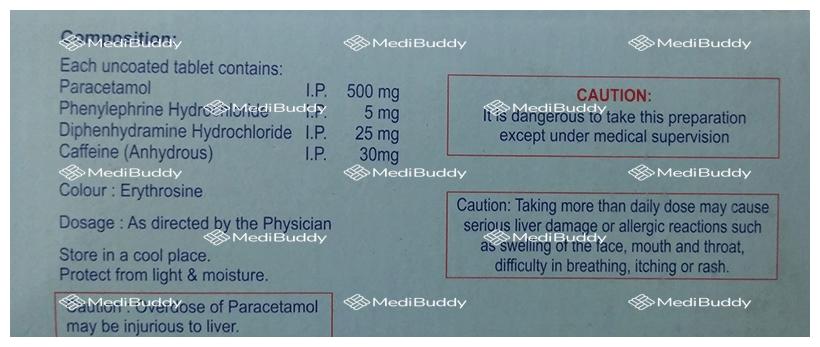Sudin Cold Tablet
By Sudin Cold
Rx
10 Tablet in a Strip

Composition
Caffeine(30mg) + Diphenhydramine(25mg) + Paracetamol(500mg) + Phenylephrine(5mg)

Manufacturer - Group Pharmaceuticals Ltd
Devraj Bldg, 'A' Wing, 4th Floor, S.V.Road, Goregoan West, Mumbai - 400 062, India.

Expires on or after
October, 2027

liver
When it comes to liver safety, caution is advised when using Sudin Cold Tablet, especially for individuals with liver disease. It may be necessary to adjust the dosage of the tablet in such cases. Therefore, it is important to consult your doctor before using Sudin Cold Tablet if you have a history of liver diseases or conditions in order to ensure proper management and safe consumption.

kidney
Sudin Cold Tablet needs caution in severe kidney disease patients. Dose adjustment may be necessary. Consult your doctor for proper guidance. Monitor blood pressure regularly. Use with caution if with kidney disease history.

alcohol
Avoid drinking alcohol when taking Sudin Cold Tablet to prevent liver damage and increased drowsiness or dizziness. Consult a doctor before combining alcohol with this medication.

driving
Sudin Cold Tablet may reduce alertness and cause drowsiness, affecting vision and balance. Avoid driving if these side effects occur. If alert post using the tablet, driving may be safe.

pregnancy
Sudin Cold Tablet is not recommended for use during pregnancy as it may be unsafe. Limited studies in humans indicate potential harmful effects on the developing baby. Consult your doctor for a risk-benefit assessment before using this medication.

breastfeeding
When you are breastfeeding, it is recommended to consult a doctor before using Sudin Cold Tablet. Limited human data indicates it is probably safe for use during this period and does not pose a significant risk to the baby.
| Habit Forming | No |
| Chemical Class | - |
| Therapeutic Class | RESPIRATORY |
| Action Class | - |
₹256.5
₹285
10% OFF
Inclusive of all taxes
Content verified by

Dr. Upasana Bhatia
MBBS - General Medicine
Last update on 18-Nov-2024








